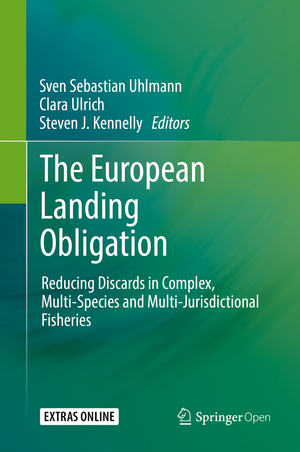The European Landing Obligation: Reducing Discards in Complex, Multi-Species and Multi-Jurisdictional Fisheries
Editat de Sven Sebastian Uhlmann, Clara Ulrich, Steven J. Kennellyen Limba Engleză Hardback – 12 ian 2019
Preț: 440.22 lei
Nou
Puncte Express: 660
Preț estimativ în valută:
84.24€ • 88.17$ • 70.11£
84.24€ • 88.17$ • 70.11£
Carte disponibilă
Livrare economică 10-24 martie
Preluare comenzi: 021 569.72.76
Specificații
ISBN-13: 9783030033071
ISBN-10: 3030033074
Pagini: 430
Ilustrații: XIX, 431 p. 78 illus., 55 illus. in color.
Dimensiuni: 155 x 235 mm
Greutate: 0.86 kg
Ediția:1st ed. 2019
Editura: Springer International Publishing
Colecția Springer
Locul publicării:Cham, Switzerland
ISBN-10: 3030033074
Pagini: 430
Ilustrații: XIX, 431 p. 78 illus., 55 illus. in color.
Dimensiuni: 155 x 235 mm
Greutate: 0.86 kg
Ediția:1st ed. 2019
Editura: Springer International Publishing
Colecția Springer
Locul publicării:Cham, Switzerland
Cuprins
Part 1. Global and European perspectives on discard policies.- 1. Strategies used throughout the world to manage fisheries discards – lessons for implementation of the EU Landing Obligation.- 2. Discards in the Common Fisheries Policy: The evolution of the policy.- 3. Requirements for documentation, data collection and scientific evaluations.- Part II. Potential social, economic and ecological impacts of the Landing Obligation.- 4. Fishing Industry perspectives on the EU Landing Obligation.- 5. The implementation of the Landing Obligation in small-scale fisheries of southern European Union countries.- 6. Potential economic consequences of the Landing Obligation.- 7. The impact of fisheries discards on scavengers in the sea.- Part III. Cultural,institutional and multi-jurisdictional challenges.- 8. How the implementation of the Landing Obligation was weakened.- 9. Muddying the waters of the Landing Obligation: how multi-level governance structures can obscure policy implementation.- 10. The Baltic cod trawl fishery: the perfect fishery for a successful implementation of the Landing Obligation?.- 11. Creating a breeding ground for compliance and honest reporting under the Landing Obligation: insights from behavioural science.- Part IV. Tactical and technological options for reducing unwanted catches.- 12. A Marine Spatial Planning approach to minimize discards: challenges and opportunities of the Landing Obligation in European waters.- 13. The best way to reduce discards is by not catching them!.- 14. Discard avoidance by improving fishing gear selectivity: helping the fishing industry help itself.- 15. Mitigating slipping-related mortality from purse seine fisheries for small pelagic fish: Case studies from European Atlantic waters.- 16. Onboard and vessel layout modifications.- 17. What to do with unwanted catches: valorisation options and selection strategies.- Part V. Control, monitoring and surveillance.- 18. Tools and technologies for the monitoring, control and surveillance of unwanted catches.- 19. Monitoring the implementation of the Landing Obligation: The Last Haul programme.- 20. Possible uses of genetic methods in fisheries under the EU Landing Obligation.
Notă biografică
Sebastian Uhlmann, Flanders Research Institute for Agriculture, Fisheries and Food, Animal Sciences Unit, Fisheries and Aquatic Production, Oostende, Belgium
Clara Ulrich, Technical University Denmark (DTU), National Institute of Aquatic Resources, Section for Ecosystem based Marine Management, Charlottenlund, Denmark
Steve Kennelly, IC Independent Consulting, Sydney, Australia
Clara Ulrich, Technical University Denmark (DTU), National Institute of Aquatic Resources, Section for Ecosystem based Marine Management, Charlottenlund, Denmark
Steve Kennelly, IC Independent Consulting, Sydney, Australia
Textul de pe ultima copertă
This open access book provides a comprehensive examination of the European Landing Obligation policy from many relevant perspectives. It includes evaluations of its impacts at economical, socio-cultural, ecological and institutional levels. It also discusses the feasibility and benefits of several potential mitigation strategies. The book was timely published, exactly at the time where the Landing Obligation was planned to be fully implemented. This book is of significant interest to all stakeholders involved, but also to the general public of Europe and to other jurisdictions throughout the world that are also searching for ways to deal with by-catch and discard issues.
Caracteristici
Provides a global overview of the European Landing Obligation policy, of its complexity and its challenges Balances diverging views of different actors and stakeholders regarding the goals of the policy and its implementation process Discusses various technical and scientific approaches to discard mitigation, based on, among others, the most recent outcomes of the EU research projects DiscardLess and MINOUW
